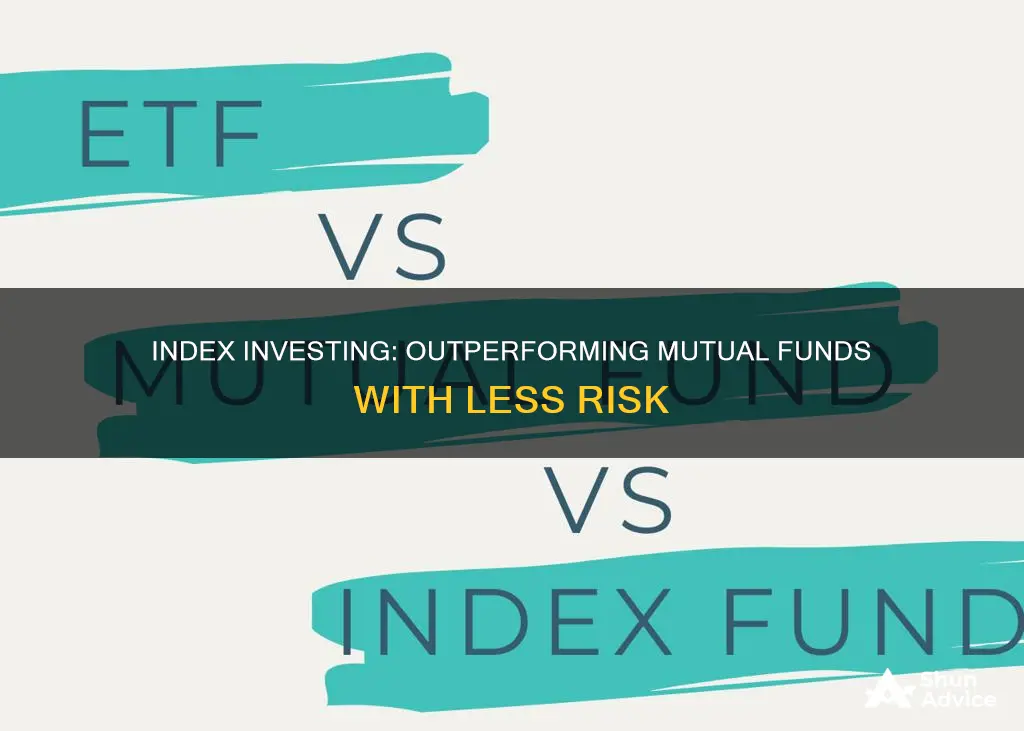
Index funds and mutual funds are both popular investment options for those looking to diversify their portfolios. They both allow investors to spread their investments across various assets and industries, reducing their level of risk. However, there are several key differences between the two that investors should be aware of. Index funds are passively managed, meaning they track the performance of a particular market index, such as the S&P 500 or the Dow Jones Industrial Average. On the other hand, mutual funds are actively managed, meaning a fund manager selects the investments with the goal of outperforming the market. This active management comes at a cost, with mutual funds typically having higher fees than index funds. Over time, these increased fees can add up to a significant amount, especially if the mutual fund doesn't outperform the index fund. Index funds are also considered less volatile and more tax-efficient, making them a popular choice for long-term, passive investors.
| Characteristics | Values |
|---|---|
| Management Style | Index funds are passively managed, whereas mutual funds are actively managed. |
| Investment Objective | Index funds aim to match the performance of a benchmark index, while mutual funds aim to beat the returns of a benchmark index. |
| Cost | Index funds have lower fees and expense ratios than mutual funds. |
| Performance Predictability | Index funds have relatively predictable performance, while mutual fund performance is less predictable. |
| Investment Choices | Index funds have fewer investment choices, whereas mutual funds offer more variety. |
| Research Requirements | Index funds require less research, whereas mutual funds require more research to compare different funds. |
| Flexibility | Mutual funds are more flexible as they can respond to market changes and adjust their holdings. |
| Risk | Actively-managed mutual funds can be riskier due to the potential for poor investment decisions by the fund manager. |
| Tax Efficiency | Index funds are generally more tax-efficient due to their buy-and-hold approach and lower turnover of the portfolio. |

Lower fees
One of the most significant differences between index funds and mutual funds is the cost, with index funds typically having lower fees and expenses. This is primarily due to their passive management style, which involves less frequent trading and lower overheads.
Index funds are passively managed, meaning they track a specific market index without the need for human intervention. This lack of active management means lower fees, as there are no investment manager salaries, bonuses, or office space to pay for. These cost savings are passed on to the investor in the form of lower fees. In contrast, mutual funds are actively managed, with fund managers and their teams conducting extensive research, analysis, and trading to try to outperform the market. These additional activities incur higher fees, which are ultimately paid for by the investor.
The fees associated with mutual funds are bundled into what is called an expense ratio, which covers investment manager salaries, bonuses, employee benefits, office space, and marketing materials. This expense ratio cuts directly into the returns received by the investor, reducing the amount of money left in the account to compound and grow over time.
Index funds, on the other hand, have much lower operating expenses. As there is no active trading involved, there are fewer transaction fees and commissions. This passive management style results in lower costs, which are reflected in the lower expense ratios of index funds compared to mutual funds.
Additionally, index funds tend to be more tax-efficient than mutual funds. Due to their buy-and-hold approach, index funds typically have lower turnover rates, resulting in fewer taxable events for investors. In contrast, the active trading in mutual funds can trigger more capital gains distributions, which are taxable to investors.
Overall, the lower fees and tax efficiency of index funds make them a more cost-effective option for investors, contributing to their growing popularity.
Equity Funds: When to Invest for Maximum Returns
You may want to see also

Passive management
Index funds that employ passive management benefit from lower operating expenses and tend to be more tax-efficient. They are also more predictable in terms of performance and are considered less volatile due to their diversified nature. However, one of the drawbacks of passive management is that it offers less flexibility and choice in terms of investment selections. The fund's performance is dependent on the overall market, and there is no potential to outperform the market.
In contrast, actively managed funds, such as mutual funds, aim to beat the market and provide higher returns. These funds are managed by investment professionals who actively select investments based on their expertise and market analysis. Actively managed funds provide more flexibility and the potential for higher returns but come with higher fees and may be more susceptible to poor decision-making by the fund managers.
Overall, passive management, as employed by index funds, is a popular choice for investors seeking a low-cost, long-term investment strategy. It provides diversification and a relatively predictable performance by mirroring a specific market index. However, it may not be suitable for investors seeking higher returns or more active management of their investments.
Tips Mutual Funds: When to Invest for Maximum Returns
You may want to see also

Higher tax efficiency
Index investing is considered to be more tax-efficient than mutual funds due to its unique structure and passive management.
Index funds, whether in the form of mutual funds or exchange-traded funds (ETFs), are inherently tax-efficient for a few reasons. Firstly, index funds replicate the holdings of an index, which means they don't trade in and out of securities as frequently as actively managed funds. This constant buying and selling by active fund managers often results in taxable gains, and these gains are often short-term and taxed at a higher rate. In contrast, the passive nature of index funds means fewer transactions and potentially lower taxes.
Secondly, when investors put money into an index fund, the fund manager has the flexibility to choose from hundreds or thousands of lots when selling a given security. This flexibility allows the fund manager to sell the lots with the lowest tax implications, reducing the overall tax burden for investors.
Additionally, the structure of ETFs provides an extra tax benefit. When investors sell shares of an ETF, they are selling to another buyer, and the fund company is usually not involved in the transaction. This means that the fund itself typically doesn't have to sell any securities, avoiding potential capital gains taxes.
While index investing is generally more tax-efficient, it's important to note that the tax implications can vary depending on the specific fund and the investor's individual circumstances. The tax efficiency of index investing is also influenced by factors such as the fund's asset class, strategy, and the overall portfolio objectives.
In summary, index investing, particularly through ETFs, offers a more tax-efficient structure compared to mutual funds due to reduced taxable events, passive management, and the ability to minimise capital gains taxes.
Pension Fund Investment: Where to Invest for Maximum Returns
You may want to see also

Lower risk
Index funds are considered a safer investment option than mutual funds because they mirror the returns of popular indexes like the S&P 500 and Nasdaq 100. This means that index funds follow the market instead of trying to beat it, making them less risky.
Index funds are passively managed, meaning they require less human intervention and are less prone to the risks associated with human decision-making. The passive management style of index funds also allows managers to charge lower investment advisory fees, which further reduces the risk for investors.
Additionally, index funds tend to be more tax-efficient than mutual funds. This is because index funds typically buy and hold securities, resulting in lower taxable events for investors. In contrast, mutual funds may experience higher turnover, triggering more capital gains distributions that are taxable to investors.
Index funds are also less volatile due to their diversified nature. By tracking a market index, index funds invest in a broad range of securities, reducing the risk associated with individual stocks or sectors.
While index funds may have lower potential returns compared to mutual funds, their lower fees, tax efficiency, and reduced risk make them a more stable and predictable investment option.
Bond Funds vs Individual Bonds: Which is the Better Investment?
You may want to see also

Long-term gains
Index funds and mutual funds are both investment options that allow you to diversify your portfolio without having to hand-pick individual stocks. However, there are some key differences between the two that make index funds a more attractive option for long-term gains.
Firstly, index funds are passively managed, meaning they aim to track the performance of a particular market index, such as the S&P 500 or the Dow Jones Industrial Average. On the other hand, mutual funds are actively managed, meaning a fund manager or a team of professionals actively selects the investments for the fund with the goal of outperforming the market. While this active management might seem appealing, it comes at a cost. Actively managed funds typically have higher fees, known as expense ratios, which can eat into your returns over time.
Index funds, on the other hand, have much lower fees, making them a more cost-effective option for long-term investing. This is because they don't require a portfolio manager or a team of researchers, and they tend to trade less frequently, resulting in fewer taxable events for shareholders. Over time, the compound effect of these lower fees can lead to significantly higher returns.
Additionally, the passive nature of index funds means they are less volatile and more predictable than actively managed mutual funds. While mutual funds aim to beat the market, history has shown that it is extremely difficult to consistently outperform passive market returns. According to the S&P Dow Jones Indices scorecard, only around 12% of funds outperformed the S&P 500 in the last 15 years.
Furthermore, index funds offer instant diversification, as they invest in a broad range of securities within the chosen index. This diversification can help to reduce risk and provide a good long-term outlook for your investments.
For these reasons, index funds are often recommended for long-term, passive investors, especially those saving for retirement. They provide a simple, low-cost way to invest in a diverse range of securities without the need for active management. By contrast, mutual funds may be more suitable for those seeking a more active investment strategy and are willing to pay higher fees for the potential of higher returns.
In summary, index funds are a better choice for long-term gains due to their low fees, passive nature, diversification benefits, and predictable performance. These factors make them a compelling option for investors seeking a "set-it-and-forget-it" investment strategy, particularly those saving for retirement.
Invest in Tesla: Top Mutual Funds to Consider
You may want to see also
Frequently asked questions
Index funds are passively managed, meaning they track a benchmark index and don't require much human intervention. This means they have lower fees than actively managed mutual funds, which are run by fund managers who are compensated for their expertise.
Index funds aim to match the performance of the market, whereas mutual funds try to beat the market. However, history has shown that it's extremely difficult for mutual funds to consistently outperform the market.
Index funds are more tax-efficient than mutual funds because they don't change their holdings as often, resulting in fewer taxable events for shareholders.







